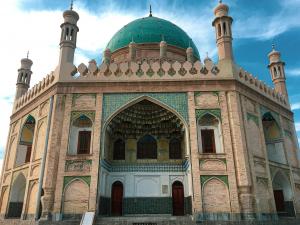In this series, I am asking the question on many American minds right now: “was Afghanistan worth it?” As I pointed out in the first essay, the question is deficient. The question we must ask is: “was it worth it for whom?” or “For whom was this war worthwhile, if anyone?”
In the previous post, I argued that the war was worthwhile for America as a nation, so long as we stayed in Afghanistan. Now that we have left, it seems that that question is harder to answer. Time will tell if it was not worth it for America to spend 20 years in Afghanistan, which is different than spending, say, 5 or 50 years. The answer will become apparent in time, especially if a reconstituted Taliban is once again able to provide safe haven for international and regional terrorism. Unfortunately, there is already evidence this will be the case.
Considering the forthcoming likelihood of a revitalized regional terrorism, we must now consider the question of whether or not the 20-year war was worth it to Afghans themselves. Here, however, we must first address the question of values. For what might be considered worthwhile or valuable to Americans is only in part the same as what might be considered worthwhile to Afghans.
Different Religion, Different Culture, Different Values
Since the bloody rule of the Mongol Emperor Timur, Afghanistan has been the least Christian country in history. It has also been one of the most isolated and Islamic countries in human history. This isolation matters, as does the enduring presence of Islam. These claims are relatively uncontroversial but often marginalized in contemporary western culture. However, this isolated, Islamic character of Afghanistan is the foundational issue at hand when addressing culture and cultural values and how they differ between countries like America and Afghanistan.
Liberals, leftists and social theorists of various political views may emphasize other things, like economic or environmental factors, as the root cause of differing value systems. But they would be wrong– just as wrong as Afghanistan’s Communist invaders were in the 1970’s and 80’s. America in the 18th century, materially speaking, would not have differed all that much from Afghanistan at the same time, or even today. Neither would the 1st-century Palestine of Jesus’ day or the 8th century world of rural Gaul have looked all that different culturally, if one only accounted for economic and material conditions.
Only the naive Marxist, or secular, Western commentator, could believe that economic or environmental conditions are primary to the values of a culture, even if they might have some moderate effects on moral perspectives and ethical obligations.
Thomas Barfield, in his excellent ethnography of Afghanistan, highlights the real issue when it comes to cultural values, namely, the Islamic worldview deeply embedded in Afghan culture:
Afghanistan is an example of an older form of Islamic society in which religion is not an ideology but remains an all-encompassing way of life. If earlier investigators [of Afghan culture] did not give Islam priority, it was because they took its overwhelming importance too much for granted and therefore in little need of explication.
Thomas J. Barfield, Afghanistan: A Cultural and Political History, Kindle Location 857
Cultures composed primarily of subsistence farming may have variations in their moral outlooks to be sure, but any profound difference makers in those cultures’ moral (and metaphysical) worldviews will not be on account of their simple material conditions or economic structures. It will instead be on account of their theological commitments and accompanying religious practices. Again, Barfield makes the case:
When religion is a way of life, it permeates all aspects of everyday social relations, and nothing is separate from it. This is the state of Islam in Afghanistan. Its influence is ever present in people’s everyday conversations, business transactions, dispute resolutions, and moral judgements. There is no relationship, whether political, economic, or social, that is not validated by religion…In such a society it is impossible to separate religion from politics because the two are so closely intertwined.
Barfield, Afghanistan, Kindle Location 867 [emphasis added]
As such, and as we know from experience, Marx and his followers were just flat wrong on pretty much everything concerning human nature and its history. Material conditions, or the lack thereof, do not generate religious belief and practice, even if it may enhance or reduce them by degree. Religious belief shapes how we understand material culture. Man is, and always will be, homo religiosus before he is homo faber, and it is in the realm of the religious that the average American and Afghan will encounter the deepest disparities (or similarities) in values.

The Islamic View of Islam
However, far be it for me, a “white Evangelical Christian” to evaluate the moral foundations of a non-white (sort of) and non-Protestant (to be sure) culture like Afghanistan, let alone the Marxist interpretation of those foundations. Instead, here are the words of Khurshid Ahmad, former general director of the Islamic Foundation, in his 1979 introduction to the works of Mawlana Mawdudi, the founder of Jamaat e Islami:
The Muslims look upon the crisis of the twentieth century as a crisis of values and believe that the way out of the human predicament lies in the construction of a new world order. The real need is not to seek concessions here and there or to effect a few changes in the institutional superstructures. What is needed is a searching re-examination of the foundations on which the entire structure of society is built and of the ideals which the culture aspires to achieve. The crisis in economic and political relations is the natural outcome of the ideals, values and institutions that characterize modern civilization.
Khursid Ahmad, Toward Understanding Islam, 9
Strangely, this sentiment sounds like many contemporary advocates of Critical Race Theory in America today. The difference, of course, being the Islamist’s proposal for what the source of this total restructuring of human society should be. Where the prophets of CRT often have no answer for how to resource the re-engineering of culture, the Islamist does:
Islam, therefore, suggests that it is only through summoning mankind toward a new vision of man and society that its house can be set in order. This calls for a basic change in man’s approach. It is only through a thorough understanding of the social ideals and values of religion and a realistic assessment of their socio-economic situation…that faith-oriented communities can develop a creative and innovative approach to the challenges confronting humanity today.
Ahmad, 9-10.
And that innovative and creative approach to confronting humanity’s challenges, in case any of our naive Western commentators have missed it, is grounded in one thing, and one thing only:
Islam stands for ‘a commitment to surrender one’s will to the Will of God’ and thus to be at peace with the Creator and with all that has been created by Him. It is through submission to the Will of God that peace is brought about. Harmonization of man’s will with the Will of God leads to the harmonization of different spheres of life under an all-embracing ideal.
Ahmad, 10.
This sentiment, conversely, is not something we would expect to hear from today’s cultural Marxist, who still trends atheist, in spite of her otherwise religious attitudes. At the same time, taking into account the necessary changes, it is something we might hear from the average Christian in America. The difference here, however, is not the question of whether God, but of who God is and what is His will. It cannot get more theological than this.
And so, on the one hand, Islam, like Marxism, also calls for an entire deconstruction of the edifice of human institutions. On the other hand, it posits the Will of God (of “Allah”) as the necessary replacement for the foundation upon which the new world order must be built. As such, our typical, naive Western commentator finds herself in a quandary. For America’s naive Western commentators also desire a new world order like their Islamist counterpart, but most certainly not one built upon the will of God!
One should note that the ultimate difference maker in how an Islamic culture like Afghanistan versus a broadly Christian one like America view morality, is what has been the central paradigm for virtue over the centuries. For Afghans that paradigm of virtue is the prophet Mohammad. For Westerners, it has traditionally been the person of Jesus, and that regardless of belief in “the Christ” part or not. To point out the vast difference between these two historical personages almost seems trite.
The Naive, Western View of Islam in Afghanistan
And so while naive Western commentators may long to see groups like the Afghan Taliban as somehow just like us, but only different, the astute, or really just commonsensical, observer of human nature knows that the religious beliefs and practices that motivate Afghans really do matter. As Christians, we can agree with the naive Western commentator in one sense however: the Taliban are just like us, if by “us” we mean wicked and hateful creatures who suppress the Truth in unrighteousness. Yes, so much is certainly the case.
But original sin is not what the naive, Western commentator has in mind, when she or he hopes that the Taliban is just like “us.” She or he, or “they” (don’t want to sound too cisgendered, after all) means that the Taliban cannot be cruel, or barbaric, or hateful toward gays or lesbians or misogynistic toward women. They cannot be intolerant or mean-spirited really. It all must be a simple misunderstanding, mustn’t it? Or, even better, they have been made this way by “us,” or at least that portion of “us” Westerners that the naive liberal commentator herself doesn’t like.
But this is all dumb. Muslims, devout Muslims, will like all people have some shared values with Westerners to be sure. They will value friendship, and family and wealth. They will enjoy good food and music and some kind of sport. They will worship and pray and play with their kids, and they will abhor certain moral failures just as we do. These are the very real universal, human values that many in the West try to tell us don’t exist universally. C.S. Lewis highlighted some of these shared values in his appendices to “The Abolition of Man.”
However, the Afghan’s ultimate values of meaning and morality will be inspired by their religious/Koranic beliefs, just as the ultimate values of meaning for Christians are inspired by their biblical beliefs. And, because American and European culture have been shaped fundamentally by Christian thought, this vast difference in cultural values cannot be bridged except through the same thing that shaped both cultures most fundamentally: religion. But, this is exactly what the American military and today’s secular European armies do not do. They do not proffer, promote or purvey any religious beliefs (at least not officially).
What the American military and coalition forces primarily brought into Afghanistan, and to no fault of their own, was an atheological and a-religious approach to a fundamentally theological and religious issue. And so, trying to answer the question of whether or not 20 years of approaching a religious and theological problem with non-religious and atheological solutions is like asking whether or not we can solve complex quadratic equations using the methods of clinical psychology. Or, better said, whether we can solve the mystery of human consciousness through algebra? This would be akin to assigning numerical values to your fears in the hopes a particular phobia could be solved through the correct arithmetic computation. In the end, it seems rather unlikely that such tools will have much effect on the problem demanding resolution.
Was It Worth It For The Afghan People?
In my own testimony of faith I have often written something like this about my experience in Afghanistan:
After becoming a Christian, a six month deployment in a remote region of Afghanistan further convinced me of the truth of the Christian faith and the promise of knowing the fullness of God that can only be known through experiencing the Messiah’s love (Ephesians 3:18-19). No power on earth: no army, no political party, no economic system, no intellectual or social movement can change the heart of a man. Only the power of God in Christ can transform us.
The present author
My answer to whether or not the 20-year presence of Americans in Afghanistan was worth it is a theological one. It is not measured by military successes or losses, by political advances (of which, we might add, there were none), by economic improvements or even by social liberation initiatives, i.e., by human rights. My convictions, being firmly grounded in the biblical revelation, lead me to believe the American presence in Afghanistan was worth it to the Afghans if, and only if, something of the Gospel of Jesus Christ was able to seep into the country through that presence.
If there is a Church in Afghanistan today, unlike in the year 2000, and if an indirect cause of there being a genuine Church in Afghanistan today was the United States’ presence there, then it has been worth it to the Afghan people for us to be there. This would also be regardless of whether those new Christians are now being slaughtered by the Taliban, which they most likely are. This last sentiment, of course, will fall on very deaf ears in an American culture dominated by the naive Western commentators of late modernity, be they atheists or even progressive Christians. From them, and those who will likely comment on this essay below, we expect only to hear cries of Christian imperialism and mockery of anything that smacks of true evangelism to the lost souls of the world.
On a purely material, non-spiritual level, alternatively, the answer of whether the American presence was worth it to the Afghans is roughly the same answer I gave in the previous post. So long as America and coalition elements stayed in the country with the necessary level of force, there were likely residual benefits to many Afghans. This would especially be the case for certain subgroups in the culture, like women, children, homosexuals and ethnic minorities and even comedians. Now that the American presence has been removed, these social and material benefits for women, children, homosexuals, ethnic minorities, et al., are also gone. At least this much needs to be clear in the heads of every rational and decent American, as the Taliban slaughter once again begins.
In the next post I will try to evaluate whether the war in Afghanistan was worth it for individual soldiers and their families, a question I do not look forward to trying to answer, but feel I must.












